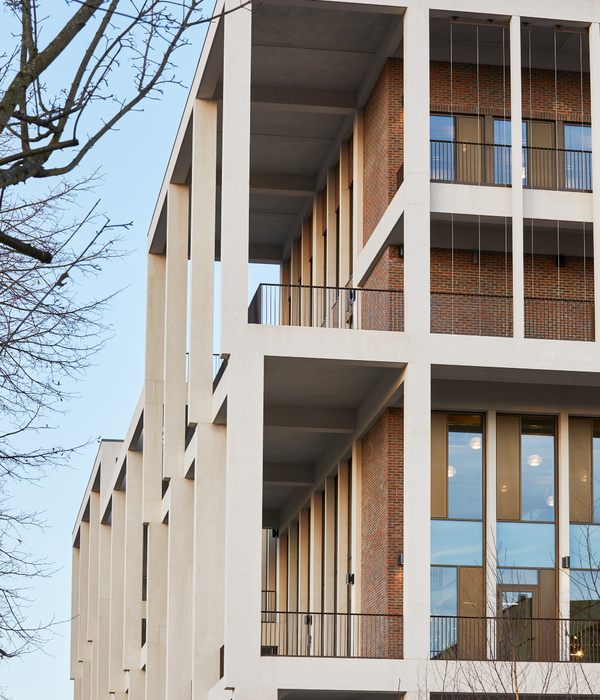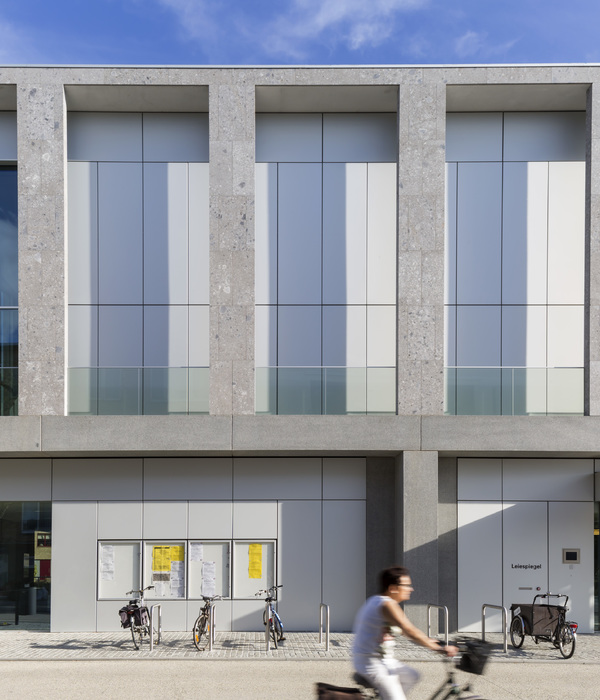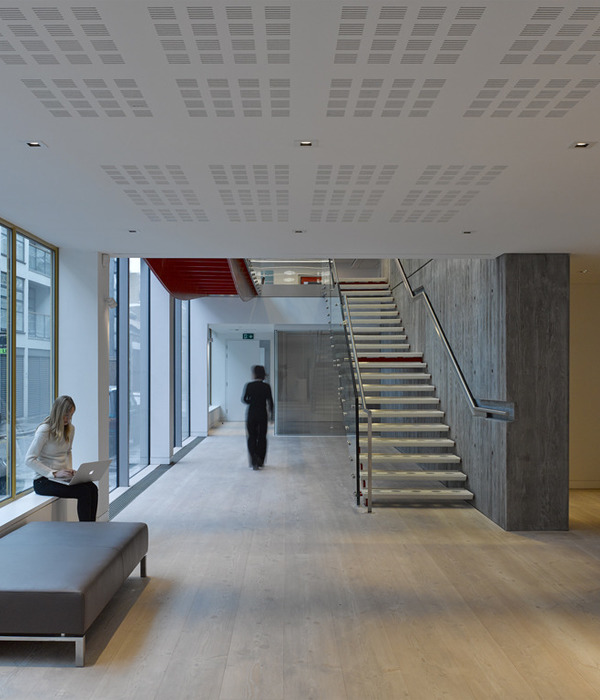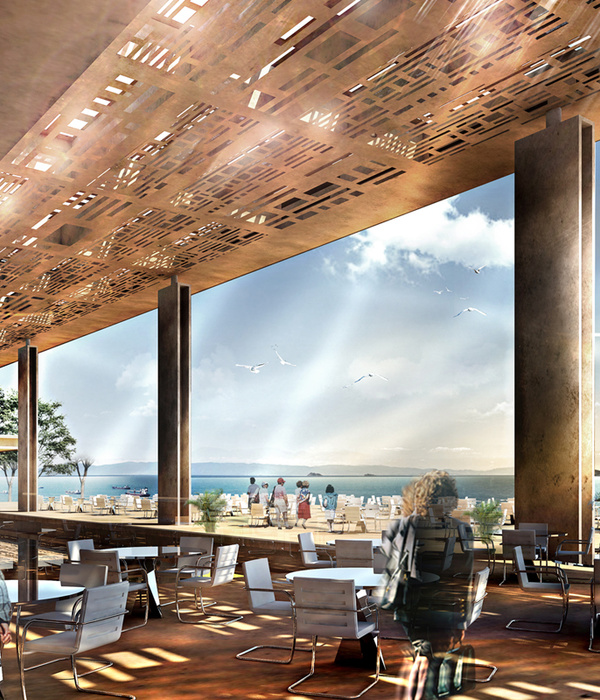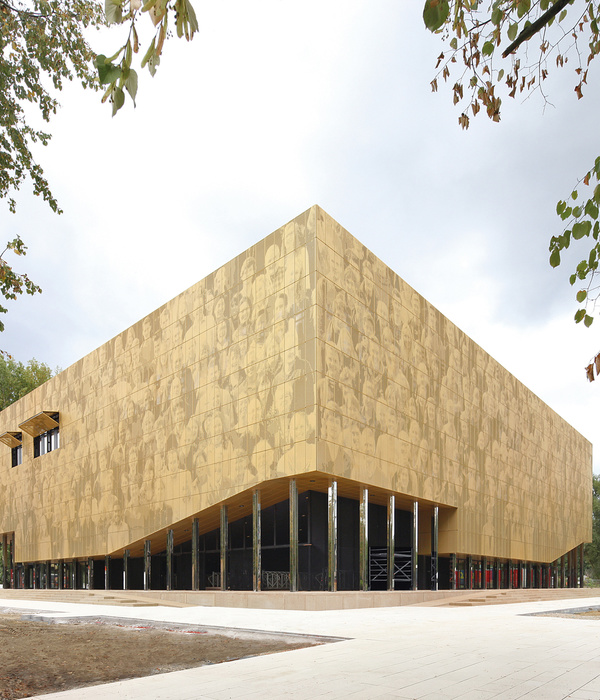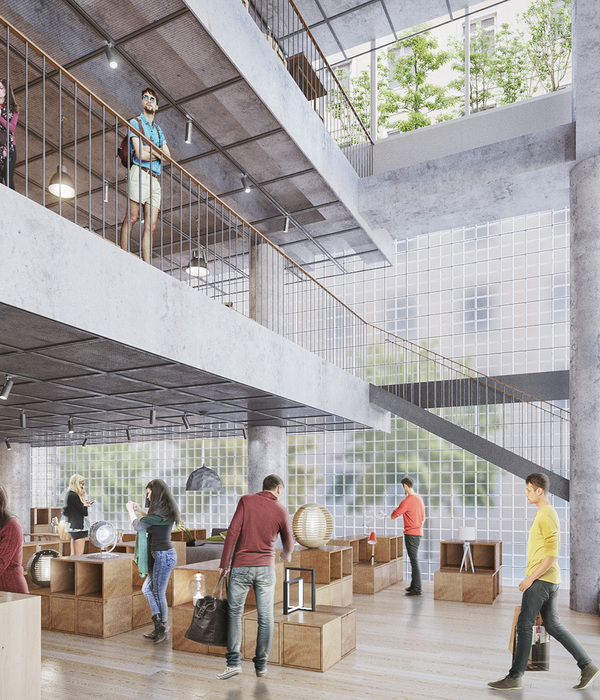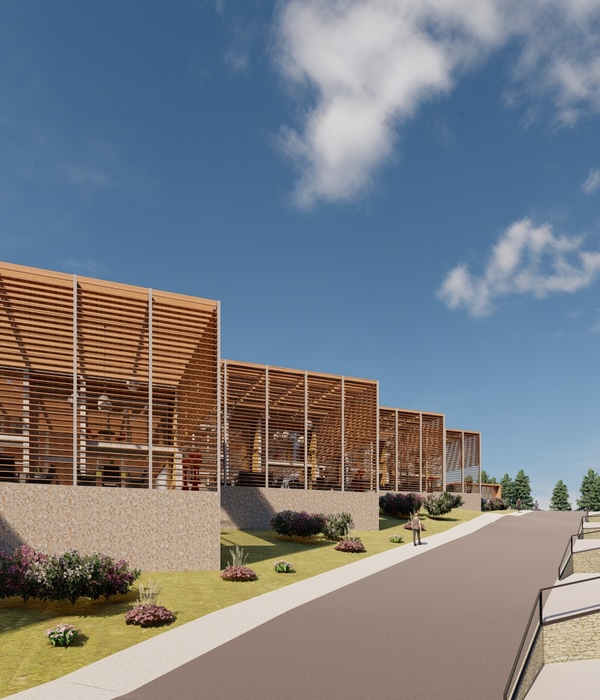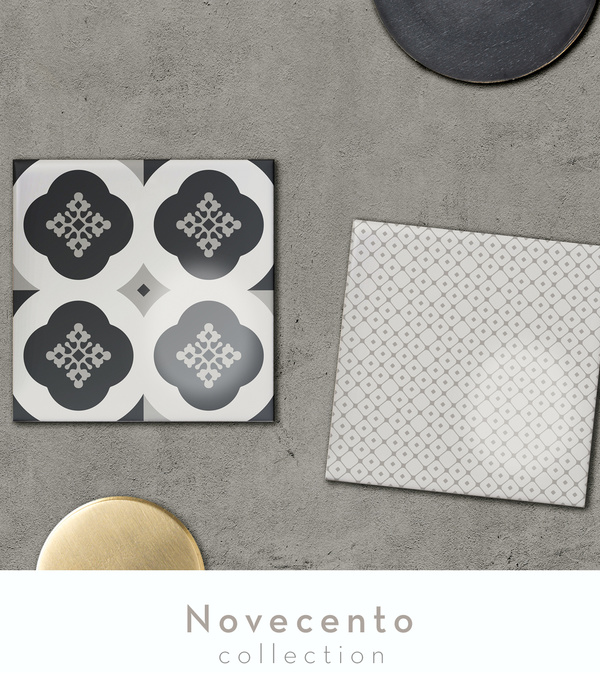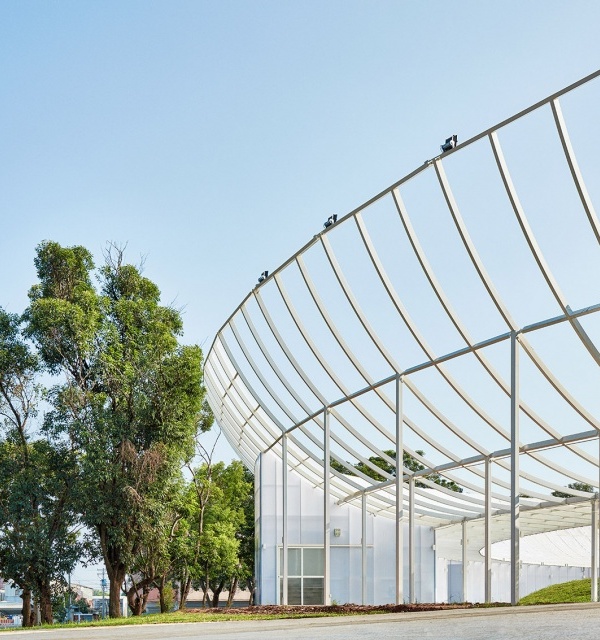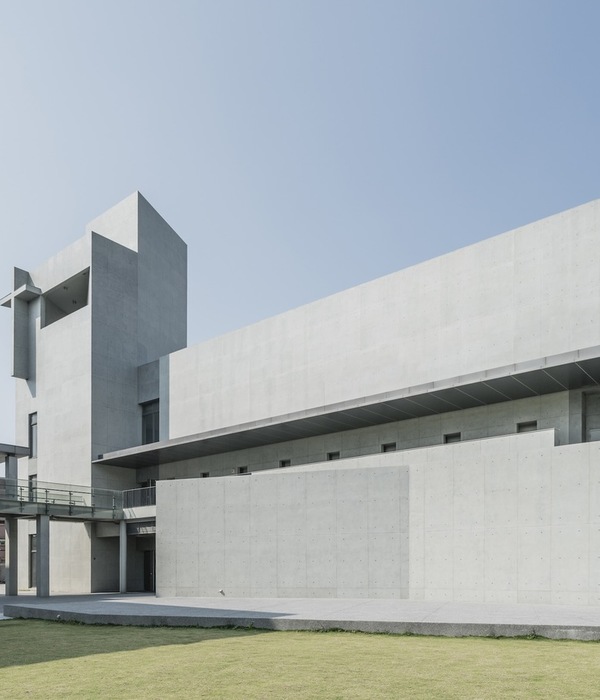为什么过去一百年间最成功的的演出都是在专业场地之外的空间举办的?建筑是否可以超越自身的局限,寻找更多可能?
Why have the most exciting theatrical events of the past 100 years taken place outside the spaces formally designed for them? Can architecture transcend its own dirty secret, the inevitability of imposing limits on what is possible?
▼夜晚的台北表演艺术中心,TPAC during night
近年来,世界各地出现了许多表演艺术中心,这些建筑仿佛遵循着某种神秘的协议,都或多或少包含以下象征性的空间组合:一个两千座的观众厅,一个1500座的剧场,以及一个黑箱剧场。从19设计以来,剧场设计都将传统的运作方式隐藏在醒目的外在形式下,用包厢体现社会阶层便是一例。尽管剧场必要的元素,如舞台、台口、观众席等,都已延续了3000多年,但这并不是它们停滞不前的理由。台北表演艺术中心采取了相反的策略,尝试利用剧院内在的机制形成建筑的标志性外观。
In recent years, the world has seen a proliferation of performance centres that, according to a mysterious consensus, consist of more or less an identical combination: a 2,000-seat auditorium, a 1,500-seat theatre, and a black box. Overtly iconic external forms disguise conservative internal workings based on 19th century practice (and symbolism: balconies as evidence of social stratification). Although the essential elements of theatre– stage, proscenium, and auditorium– are more than 3,000 years old, there is no excuse for contemporary stagnation. TPAC takes the opposite approach: experimentation in the internal workings of the theatre, producing (without being conceived as such) the external presence of an icon.
▼艺术中心鸟瞰,aerial view of TPAC
▼艺术中心与街道,street and TPAC
▼虚实体块形成鲜明对比,solid and transparent volumes contrasting with each other
▼街景,street view
台北表演艺术中心包含三个剧场,每个剧场都可以独立运作。剧场插放在中央方形体块中,后者将舞台、后台以及辅助空间简单高效地结合在了一起。这种安排让舞台能够变化、融合,满足前所未有的场景需求。设计在专业性的优势上,提供了不受限制的自由可能。
TPAC consists of three theatres, each of which can function autonomously. The theatres plug into a central cube, which consolidates the stages, backstages and support spaces into a single and efficient whole. This arrangement allows the stages to be modified or merged for unsuspected scenarios and uses. The design offers the advantages of specificity with the freedoms of the undefined.
▼分析图,建筑包含三个剧场,analysis, architecture including three theaters
典型的表演中心都有前后两面。台北表演艺术中心在紧凑的布局下,形成了多个不同的“面孔”,单独的观演厅向外突出,漂浮在繁忙的城市空间之上。外观上看去,观演厅如一个神秘的黑暗物质,与旁边由波纹玻璃围合、明亮而充满活力的方块形成鲜明对比。方块的底部抬起,让街道延伸到建筑之中,再逐渐转入不同的剧场。
Performance centres typically have a front and a back side. Through its compactness, TPAC has many different “faces,” defined by the individual auditoria that protrude outward and float above this dense and vibrant part of the city. The auditoria read like mysterious, dark elements against the illuminated, animated cube that is clad in corrugated glass. The cube is lifted from the ground and the street extends into the building, gradually separating into different theatres.
▼悬浮在街道上方的球形观演厅,Proscenium Playhouse suspended above the street
传统剧场如同一个接在方块上的悬浮星球。听众通过内外表皮间的道路进入观演厅。厅内,内侧壳体与方块交接的地方形成了一个独特的台口,可以布置出任何你能想象的场景。
The Proscenium Playhouse resembles a suspended planet docking with the cube. The audience circulates between an inner and outer shell to access the auditorium. Inside the auditorium, the intersection of the inner shell and the cube forms a unique proscenium that creates any frame imaginable.
▼球形观演厅室内效果图,interior of the Proscenium Playhouse
大剧院是对20世纪剧院空间的一次当代革新。设计没有采用标准的盒子形状,创造了一个略不对称的空间。舞台层、正厅观众席和包厢被整合在了一片折板中。多功能剧场位于大剧院层的另一侧,灵活的空间能够适应最为实验性的演出需求。
The Grand Theatre is a contemporary evolution of the large theatre spaces of the 20th century. Resisting the standard shoebox, its shape is slightly asymmetrical. The stage level, parterre, and balcony are unified into a folded plane. Opposite the Grand Theatre on the same level, the Multiform Theatre is a flexible space to accommodate the most experimental performances.
▼大剧院室内,不同观众席和舞台整合在一片折板中,interior of the Grand Theater, different seatings and stage unified into a folded plane
▼多功能剧场,可以满足不同形式的表演需求,Multiform Theater accommodates different types of performance
超级剧场是一个厚重的、工厂式的空间,通过将大剧场和多功能剧场组合而成。它可以容纳过去无法实现的演出,如1958年B.A. Zimmermann的歌剧《士兵》,需要100米长的舞台才能表演。现有的传统作品可以改编到纪念性的尺度上,而尚未出现的新戏剧形式也将在超级剧场上发出光彩。
The Super Theatre is a massive, factory-like environment formed by coupling the Grand Theatre and Multiform Theatre. It can accommodate the previously impossible ambitions of productions like B.A. Zimmermann’s opera Die Soldaten (1958), which demands a 100-metre-long stage. Existing conventional works can be re-imagined on a monumental scale, and new, as yet unimagined forms of theatre will flourish in the Super Theatre.
▼连接大剧院和多功能剧场形成超级剧场,Super Theater created by connecting the Grand Theater and the Multiform Theater
普通公众,无论是否购买了演出票,都可以进入台北表演艺术中心。公共流线穿过剧场的基础设施,通常被隐藏起来的生产空间则变成了一场“可见的”表演,给人们留下了深刻的印象。公共流线不仅让观众可以更好地体验剧场生产,也为剧场带来了更加广阔的人群。
The general public—even those without a theatre ticket—are also encouraged to enter TPAC. The Public Loop is trajectory through the theatre infrastructure and spaces of production, typically hidden, but equally impressive and choreographed as the “visible” performance. The Public Loop not only enables the audience to experience theatre production more fully, but also allows the theatre to engage a broader public.
▼流线分析,circulation analysis
▼室外公共空间,outdoor public space
▼夜景,night view
▼一层平面图,first floor plan
▼二层平面图,second floor plan
▼五层平面图,fifth floor plan
▼立面图,elevations
▼剖面图,sections
Project: Taipei Performing Arts Center
Status: Under construction, scheduled completion: mid-2021
Authority in charge: Taipei City Government
Executive Departments: Department of Cultural Affairs, First District Project Office, Department of Rapid Transit Systems, New Construction Office, Public Works Department
Budget: Estimated: 5.4 billion Taiwan Dollars (around €140 million)
Program: Total 58,658 m2. One 1,500-seat theatre and two 800-seat theatres
Height: 63 m
Design Architect: OMA
Partners: Rem Koolhaas, David Gianotten
Project Team CA phase:
Project Director: Chiaju Lin
Associates: Inge Goudsmit, Daan Ooievaar
Design Team: Kevin Mak, Han Kuo, Vincent Kersten
Architect of Record: Kris Yao Architects
Partners-in-charge: Kris Yao, Willy Yu
Consultants: Arup, dUCKS scéno, Inside Outside, DHV, ABT, with local collaborators: Evergreen Consulting Engineering Inc, Heng Kai Inc, IS Leng and Associates Engineers, Creative Solution Integration Ltd., Taiwan Fire Safety Consulting, Ltd., CDC Inc, Chroma33, Segreene Design and Consulting, Everest Engineering Consultants, Inc., Sino Geotech
Contractor:
Main construction:
International
Engineering & Construction Co., Ltd(former general contractor) / Sun-Sea Construction Co. LTD. (façade continuous construction) / Ancang Construction Co. LTD. (interior continuous construction)
Theater equipment: L&K Engineering Co. LTD. / IX Co. LTD. / JR Clancy
{{item.text_origin}}

